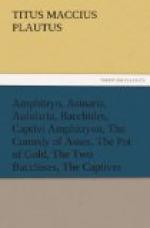Nic.
Euge, socium aerumnae et mei mali video.
Philoxene, salve.
(grimly)
Splendid! I see my partner in toil and woe.
Good
day to you, Philoxenus.
Phil.
Et tu. unde agis?
And to you. Where are you coming from?
Nic.
Unde homo miser atque infortunatus.
Where a wretched, unlucky man should come from.
Phil.
At pol ego ibi sum,
esse
ubi miserum hominem decet atque infortunatum.
Gad! but I’m
on the very spot where a wretched, unlucky man
should be.
Nic.
Igitur pari fortuna, aetate ut sumus, utimur.
Then we’re alike in luck as we are in years.
Phil.
Sic est. sed tu,
quid tibist?
So it seems. But you—what is your trouble?
Nic.
Pol mihi par, idem est quod tibi.
Good Lord! The same as yours.
Phil.
Numquid nam ad filium haec aegritudo attinet? 1110
This dolefulness
of yours has something to do with your son,
eh?
Nic.
Admodum.
(morosely) Rather!
Phil.
Idem mihi morbus in pectorest.
The same ailment is worrying me.
Nic.
At mihi Chrysalus optumus homo
perdidit filium, me atque rem omnem meam.
Well, but Chrysalus—that
pattern of excellence—has ruined
my boy and me
and all that’s mine!
Phil.
Quid tibi ex filio nam, obsecro, aegrest?
What in the world has your son done to vex you, pray?
Nic.
Scies:
id, perit cum tuo: ambo aeque amicas
habent.
You shall know:
this—he’s going to the dogs along
with
yours: the
both of them alike have mistresses.
Phil.
Qui scis?
How do you know?
Nic.
Vidi.
I saw.
Phil.
Ei mihi, disperii.
(with apparent
conviction) Oh dear me! Terrible,
terrible!
Nic.
Quid dubitamus pultare atque hue evocare ambos foras?
Why don’t
we go straight up and knock; and call them both
out here?
Phil.
Haud moror.
(lukewarm) I have no objection.
Nic.
Heus Bacchis, iube sic actutum aperiri
fores,
nisi mavoltis fores et postes comminui
securibus.
(pounding on
Bacchis’s door) Hi! Bacchis! Be
so good as to
have the door
opened this instant, unless you prefer to have
door and doorposts
smashed in with axes!




